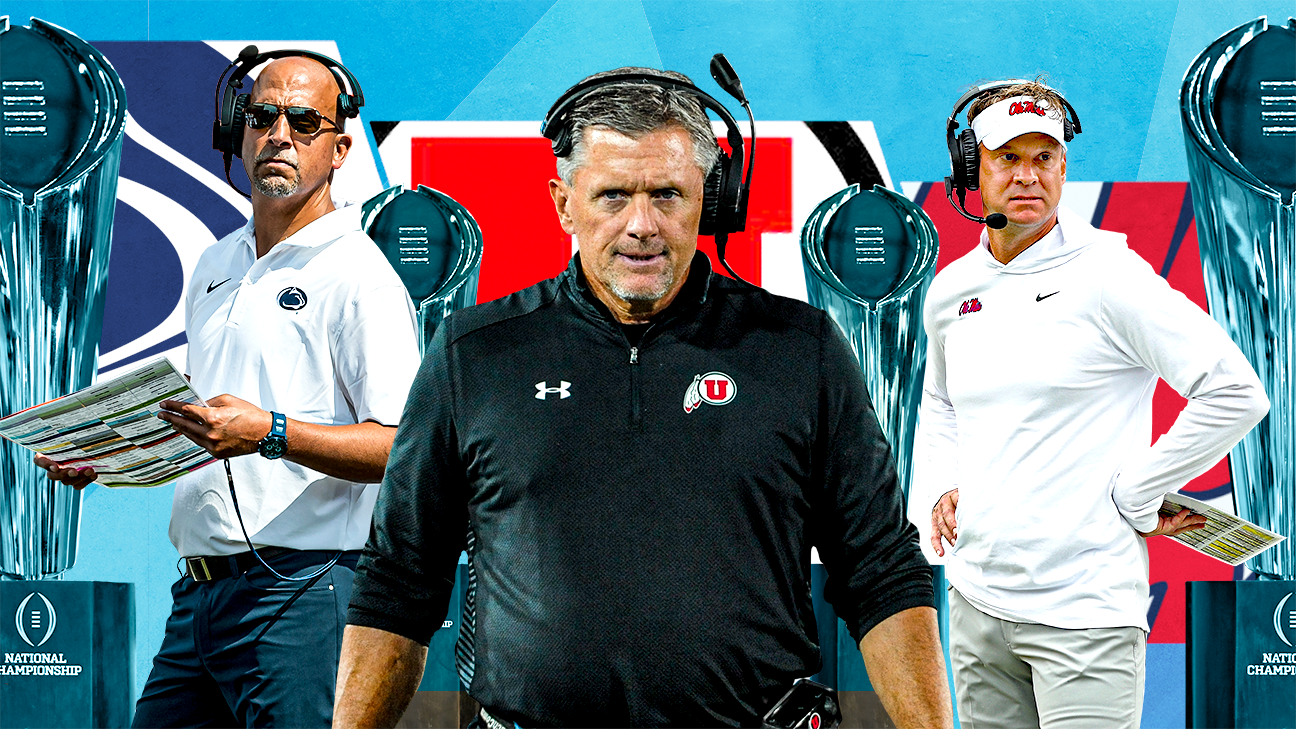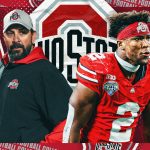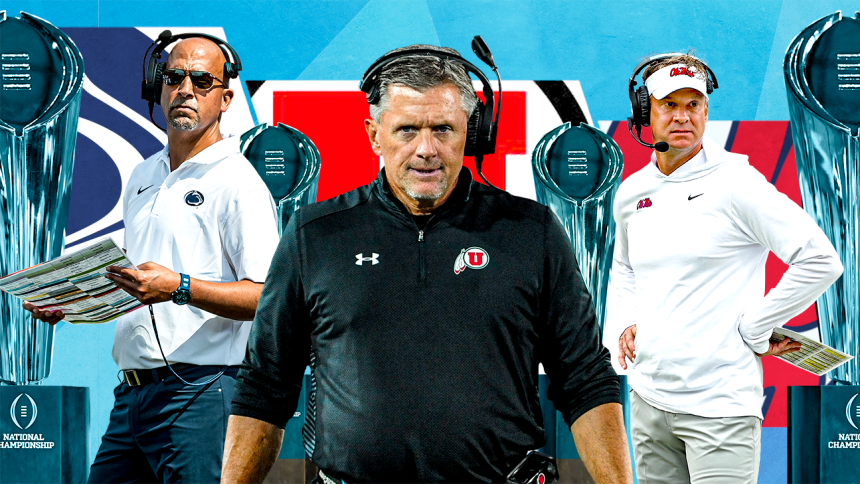
Utah coach Kyle Whittingham said the seniors on his roster are looking forward to being able to “control their own destiny” when it comes to reaching the 12-team College Football Playoff — unlike before, he said, when they “had to rely on outside help” in the four-team format.
This year, the five highest-ranked conference champions are guaranteed a spot in the CFP, which means the winners of the Big Ten, Big 12, SEC and ACC are almost certainly locks (barring some improbable circumstance in which a second Group of 5 conference champion is ranked ahead of one of them).
Which means the Big 12 champion is in. (And in case you missed it, Utah is now in the Big 12).
“We’re definitely excited about the new playoff format and the opportunity to make the playoffs on your own merit and not to be voted by a committee to get into that exclusive club,” Whittingham said.
Wellll … the committee is still there. And it will still rank 25 teams each week. Because if a contender doesn’t win its league? The committee’s next seven highest-ranked teams are in.
The entire system, though, is more inclusive. It’s more forgiving. And Utah isn’t the only team in the country that now has a legitimate chance to make the CFP for the first time. Ranked in order from best-to-worst chances (according to ESPN Analytics), here are eight teams that could get their first shot at playing for the national title in the CFP era.

![]()
Last year’s record: 10-3
Highest CFP ranking: No. 4 on Nov. 5, 2019
ESPN Analytics: 59.1% chance to make playoff
How the 12-team CFP helps them: Penn State doesn’t have to beat Ohio State and Michigan. Period. The Nittany Lions are no longer stuck in one of the nation’s most difficult divisions because the Big Ten East doesn’t exist anymore. Instead, the league’s top two teams will play for the Big Ten title — and Penn State can still get into the CFP even without winning that. It’s an important new path, because even when it did win the Big Ten (2016), Penn State still wasn’t good enough for the selection committee, which instead chose Ohio State even though the Buckeyes didn’t reach the Big Ten title game. The Nittany Lions would have qualified for a 12-team CFP in three of the past five seasons, including the most recent two, when they finished No. 10 and No. 11 on Selection Day. Penn State hosts Ohio State on Nov. 2 this year and will likely have to beat the Buckeyes at some point this season to win the league, but if it doesn’t, there are other opportunities to impress the committee for an at-large spot.
What could derail them: Conference expansion. Hello, Oregon. And USC. And UCLA. And Washington! The Big Ten is bigger — and better — which means it’s also going to be more difficult to win consistently. Penn State has back-to-back October games against the L.A. schools, including Oct. 12 at USC. It hosts Washington on Nov. 9. And although Oregon isn’t on the regular-season lineup, it’s a team that could certainly appear in the Big Ten championship game. If Ohio State and Oregon are both CFP teams, it could come down to Penn State, Michigan and/or USC as the selection committee’s top remaining Big Ten choices.
![]()
Last year’s record: 11-2
Highest CFP ranking: No. 9 (four times in 2023, including on Selection Day)
ESPN Analytics: 37.3% chance to make playoff
How the 12-team CFP helps them: They don’t have to beat Alabama and Georgia to get in. Mizzou lost to Georgia last year but still would have qualified. This year’s team can lose at Alabama on Oct. 26 and still get in. If Missouri finishes 11-1 — which is exactly what ESPN’s FPI projects, with the lone loss coming in Tuscaloosa — its chances of earning an at-large bid will be extremely high. It could also be playing for the SEC championship in that case, although that would depend on what Bama does.
What could derail them: A ho-hum nonconference lineup. This will still matter to the selection committee as it ranks teams, and Missouri faces Murray State, Buffalo, Boston College and UMass. That will matter to the selection committee only if (A) Missouri doesn’t win the SEC and (B) it loses to Alabama and somebody else. Two-loss teams will be in the 12-team field, but the selection committee will still be looking for the best two-loss teams with the most statement wins against teams ranked in its top 25.
![]()
Last year’s record: 9-4
Highest CFP ranking: No. 1 on Nov. 1, 2022
ESPN Analytics: 36.9% chance to reach playoff
How the 12-team CFP helps them: They will have the margin for error they need. The Vols would have made the 12-team field in 2022, when they finished sixth on Selection Day, but that was their only top-20 finish in the first decade of the playoff. Tennessee faces both Alabama and Georgia this year, but if those are the only two games it loses, it could still have a chance in this system. According to ESPN Stats & Information, in the first 10 years of the playoff, 23 of the 25 SEC teams to finish with two or fewer losses finished in the committee’s top 10.
What could derail them: Conference expansion. Tennessee’s trip to Oklahoma on Sept. 21 is now a conference game, and ESPN’s FPI gives the Sooners a 59.9% chance to win. If the Vols lose three games (at Oklahoma, vs. Alabama and at Georgia), their playoff hopes will likely shatter. There’s not enough on the rest of the schedule to compensate for that in the committee meeting room, where wins against ranked opponents are a major focus. Tennessee has a respectable nonconference game against NC State in Charlotte, but wins against Chattanooga, Kent State and UTEP won’t separate the Vols from other contenders, and their other SEC opponents also might not be ranked.
![]()
Last year’s record: 9-4
Highest CFP ranking: No. 7 on Nov. 4, 2014
ESPN Analytics: 21.4% chance to reach playoff
How the 12-team CFP helps them: A three-loss power-conference champion (in all likelihood) is in. Unlike in 2022. That season, three-loss K-State beat TCU in overtime to win the Big 12, but the selection committee chose the previously undefeated Frogs for the top-four spot. That year, K-State finished No. 9 on Selection Day at 10-3 and still would have made the CFP as an at-large team. It gets much dicier, though, trying to secure an at-large bid as a three-loss team that didn’t win the conference. In the new format, it doesn’t matter how many losses a conference champion has — as long as it is one of the five highest-ranked conference champs. According to ESPN Analytics, K-State has the second-best chance to make the Big 12 title game (28.8%), behind only Kansas. The question is whether the committee will rank K-State high enough to earn an at-large bid if it doesn’t win the Big 12. That’s why the Wildcats are lower on this list.
What could derail them: Another loss to Tulane. Remember that from the 2022 season? One of the Wildcats’ three regular-season losses was to Tulane. The Green Wave are a strong contender for the American Athletic Conference championship and will be a tricky Week 2 road trip. A head-to-head loss to Tulane could be a discussion point for the committee on Selection Day if teams have comparable résumés, and if K-State doesn’t win the Big 12, that loss could cost the Wildcats a spot. Last year, the highest finish for a three-loss team was No. 13 LSU.
![]()
Last year’s record: 11-2
Highest CFP ranking: No. 4 on Oct. 28, 2014
ESPN Analytics: 20.7% chance to reach playoff
How the 12-team CFP helps them: A two-loss SEC team will be a staple of the 12-team field. It’s going to be normal to have a field that includes teams with multiple losses, so the Rebels don’t have to win the SEC to qualify. In a 12-team format, they would have reached the CFP in 2021 and 2023. Those were both 10-2 seasons the CFP selection committee honored with top-11 finishes on Selection Day. If the committee had that much respect for the Rebels then, it should have even more now for what coach Lane Kiffin said will be his best team yet. Kiffin no longer has to beat former Alabama coach Nick Saban, who has retired, and he gets Georgia at home Nov. 9.
What could derail them: The Oct. 12 trip to LSU. It’s the second straight Saturday on the road, as Ole Miss is at South Carolina on Oct. 5, and if the Rebels lose to LSU, that puts them into a very precarious playoff position heading into their season-defining stretch. Ole Miss still faces Oklahoma and Georgia in the second half of the season — two games ESPN’s FPI projects the Rebels will lose. How they fare at LSU will determine their margin for error for the rest of the season. A third loss would be devastating with so many other contenders, including in their own league. The committee considers head-to-head results, and losses to LSU, OU and Georgia would be devastating in that regard.
![]()
Last year’s record: 10-4
Highest CFP ranking: No. 5 on Nov. 15, 2016
ESPN Analytics: 18.3% chance to reach playoff
How the 12-team CFP helps them: The ACC runner-up has a shot. Louisville lost to Florida State in last year’s ACC championship game, and a similar scenario this year could open the door to an at-large bid if the Cardinals can’t win the league. Louisville has multiple opportunities to impress the committee with road games at Notre Dame and Clemson, two opponents expected to finish in the CFP top 25. Those are the kind of statement wins that would impress the committee enough to consider the Cardinals for a playoff spot. Last year, Louisville’s win against Notre Dame earned it enough respect in the committee meeting room for a top-10 ranking in November. The problem was maintaining it after losing to rival Kentucky.
What could derail them: Another bad loss. Had the 12-team field existed last year, Louisville could have had a shot as the ACC runner-up if it hadn’t lost to Pitt (and a Florida State team with its third-string quarterback). The selection committee historically has a hard time forgetting (and forgiving) a bad loss, and Pitt finished 3-9 last year. If Louisville is going to lose and still earn a playoff spot without the ACC title, the ideal scenario is at Clemson, at Notre Dame or in the ACC title game. The committee also factors in how games are won or lost, and a lopsided loss to an unranked opponent can also be hard to overcome. In addition to facing Pitt again Nov. 23, Louisville has a difficult road trip the week before at Stanford, which could present the scenario of a flat performance — especially one week after an emotionally charged, playoff-impacting game at Clemson.
![]()
Last year’s record: 8-6
Highest CFP ranking: No. 19 (three times, including Selection Day in 2019)
ESPN Analytics: 16.4% chance to reach playoff
How the 12-team CFP helps them: The highest-ranked Group of 5 conference champion is guaranteed a spot. That’s why the Broncos are ranked higher on this list than some teams that might be better on the field but won’t win their respective leagues. According to ESPN Analytics, Boise State has the second-best chance to win its conference (36%) behind Liberty (42%) of C-USA. The difference between Boise State and Liberty, though, is schedule strength. Liberty — again — has the worst schedule in the FBS and doesn’t play any Power 4 opponents, while Boise State is at Oregon on Sept. 7 and hosts both Washington State and Oregon State. The selection committee will know that the Mountain West Conference will play the most Power 4 opponents of any Group of 5 league. One of the group’s most controversial decisions last year was admitting Liberty into a New Year’s Six Bowl with the worst schedule in the country. The Broncos can give the committee a stronger résumé to consider if they can win the Mountain West.
What could derail them: The scheduling partnership with the Pac-12. ESPN’s FPI gives Boise State a 62% chance to beat Washington State and projects an even closer game against Oregon State, giving the Broncos a 51.4% chance to win the regular-season finale. Let’s not pretend Boise State is going to win at Oregon, where the Ducks have lost only once in the past five seasons. The Broncos also have tricky games at San Jose State and Hawai’i. If they are going to finish as the highest-ranked Group of 5 conference champion, the Broncos can’t lose three games. Even two opens the door for debate, given what happened last year with Liberty. Boise State needs to leave no doubt in that room and either go 2-0 against the Pac-12 leftovers with maybe one stumble in the league or lose two to the former Pac-12 schools and go undefeated in league play. The ideal scenario, of course, is a lone loss to the Ducks — and that’s what the FPI projects.
![]()
Last year’s record: 8-5
Highest CFP ranking: No. 5 on Dec. 3, 2019
ESPN Analytics: 12.5% chance to reach playoff
How the 12-team CFP helps them: Their conference titles will suffice. Utah won back-to-back Pac-12 championships in 2021 and 2022 — and still didn’t make the playoff. It’s not as if past selection committees haven’t had respect for the Utes. Since 2014, there have been 60 CFP rankings released, and Utah has been ranked in 44 of those polls — the most of any team without a playoff appearance. Now as a member of the Big 12, in this new expanded field, if Utah wins its conference, it will earn its place in the CFP.
What could derail them: Parity. There have been four different Big 12 champs over the past four seasons, and seven different teams have played in the conference title game during that stretch. This season should be no exception, as the 16-team Big 12 will feature one of the nation’s most wide-open conference races. Big 12 commissioner Brett Yormark called it the “deepest” football conference in America, but the league needs one great team to emerge from the pack of good ones. It wouldn’t be shocking for Utah to be in prime playoff position only to lose at UCF in the regular-season finale. Or at Colorado on Nov. 16. Will the selection committee rank multiple Big 12 teams and validate Yormark’s comments? Or will the conference cannibalize itself into mediocrity?












